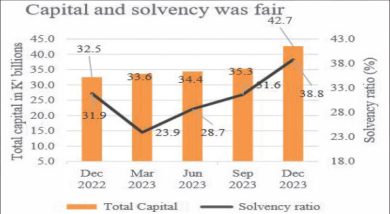2012: year of mounting pressure on Malawi’s tobacco
 The future of tobacco, Malawi’s major export earner, remains uncertain with the World Health Organisation (WHO) anti-smoking campaign. But what should Malawi do to cushion the impact the campaign may have on its economy? Dumbani Mzale tackles this and other issues in the tobacco sector.
The future of tobacco, Malawi’s major export earner, remains uncertain with the World Health Organisation (WHO) anti-smoking campaign. But what should Malawi do to cushion the impact the campaign may have on its economy? Dumbani Mzale tackles this and other issues in the tobacco sector.
Uncertainty continues to enshroud the country’s tobacco industry in the wake of growing pressure from the World Health Organisation’s Framework Convention on Tobacco Control (WHO-FCTC). And 2012 was not an exception as it saw pressure from FCTC piling on Malawi’s number one crop, tobacco.
FCTC is the brainchild of the WHO, championing anti-tobacco issues and its treaty carries a whole range of articles which seek to end smoking in the world.
Articles 17 and 18, for example, press hard for the implementation of economically sustainable alternatives to tobacco growing and propose the discontinuance of tobacco financing and incentive programmes.
They also propose to curtail support mechanisms that promote tobacco production; reduce land under tobacco cultivation, stop all government policies that promote tobacco production and remove minimum support prices.
On one hand, articles 9 and 10 propagate limitations on type of ingredients used in making cigarettes.
The fight against the guidelines got fierce in the year, sending shivers to Malawi which continues to depend on tobacco as its main export commodity.
Both directly and indirectly, tobacco industry alone provides livelihood to 71.5 percent of the population, 51 percent of which are women, according to the Ministry of Agriculture and Food Security.
In 2010, about 1.06 million Malawians were actively involved in tobacco growing through clubs and estates, according to the ministry. And over the years, its contribution to Malawi’s total wealth as measured by the gross domestic product (GDP) has been substantial, averaging 15 percent of the total national output.
Malawi felt relieved when the fifth Conference of Parties (CoP) proposed to postpone debate and implementation of the contentious articles to the next meeting to be held in Russia in 2014.
Although the implementation of the articles have been postponed, the fact remains that the future of tobacco is still uncertain.
Currently, Malawi is not yet a party to FCTC, but government, through the Ministry of Agriculture and Food Security, says Malawi is still looking into the issue of joining FCTC at Cabinet level.
During a 24th Tobacco Association of Malawi (Tama) in Lilongwe earlier this year, it was apparent that the tobacco industry is shaken by the FCTC guidelines, which according to the association, wants to abolish tobacco growing by 2025.
“In brief, the measures seek to abolish tobacco growing by 2025, abolish contract growing since it encourages tobacco farming, stop financial institutions from providing finance to tobacco farmers and abolish tobacco grower associations by 2015,” said Tama president Reuben Maigwa.
Maigwa said Malawi should analyse the implications of FCTC and to start living within the “confines of the implications so that we are not overly affected.
President Joyce Banda is also aware of the negative impacts of the FCTC guidelines, once implemented fully.
The President, during the Tama congress, said the FCTC will continue to take its toll by way of having several negative implications on production, marketing and consumptions.
The President has approved the introduction of Integrated Production System (IPS) as a response to some of the negative effects of the FCTC.
Perhaps the question could be: Why is Malawi not promoting flue-cured tobacco which is not targeted under the FCTC articles?
Local tobacco experts contend that there is huge demand for flue-cured worldwide with an estimated number of smokers in China hitting 400 million.
But Tobacco Control Commission (TCC) chief executive officer Dr Bruce Munthali argued that while it is true that there is huge demand for flue-cured tobacco worldwide, it is capital intensive to venture into such farming.
Looking at the pressure from FCTC, government has also embarked on a campaign geared at diversifying the economy into other sectors such as mining and tourism.
The Joyce Banda administration is also encouraging farmers to grow legumes such as beans, groundnuts, pigeon peas and soya beans which have a huge market in Europe and Asia.




